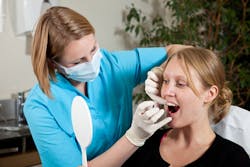Thursday Troubleshooter: Hygienists can't treat perio effectively, dentist looks other way
QUESTION: This office recently (within the last year) bought another practice and hired the two hygienists from that practice, where they were not allowed, or just did not do, any perio treatment. Many of their patients have a lot of calculus subgingival and perio disease. The hygienists are good about explaining disease to patients but are still unable to thoroughly treat periodontal disease. One won’t even use an ultrasonic. My concern is that the dentist now allows them to do SRP, or just continue to do prophys. He doesn’t want to fire them for fear their patients might leave. I think this is a lawsuit waiting to happen. I have voiced my concerns, but to no avail.
ANSWER FROM RACHEL WALL, RDH, BS,Inspired Hygiene:
Many years ago I worked in a practice where I saw lots of undiagnosed and untreated perio. Luckily, the doctors were very supportive of my educating patients, and they backed me up on the treatment I recommended. Over time, the rest of the team saw that patients were accepting treatment that they were afraid to present, and patients were healthier because of it. The rest of the staff eventually got on board, but it was a slow process.
What I’ve learned over the years as a clinical hygienist and working with thousands of hygienists and dentists across the country is:
1. Undiagnosed perio is usually a systems problem – I’ve found that 98% of dental professionals want to perform the treatment that’s in their patients’ best interest. Blatant neglect is rare, in my opinion.
The problem is often that there is no set system for:
• The threshold between health and disease
• What treatment to recommend when disease is present
• How to use the ADA insurance codes
• When to bring the patient back after treatment
All of these unknowns create confusion. When people are confused, they rarely take action. This is true for patients and dental team members alike.
2. Mindset – Dentists and team members often fear that patients will reject the treatment and/or reject them personally if they present the facts and any treatment other than a “cleaning.” What convinces people to get out of their comfort zone is when it’s too painful to stay where they are. Until the team recognizes that the risk of lawsuit or the patients’ risk of systemic health problems related to untreated perio is a painful reality, they may not change. The conviction to treat disease and help patients get healthy must be stronger than the desire to keep doing things the same way.
3. Patients will often accept treatment if the proper “evidence” of disease is presented – This evidence may include: the patient being involved in the diagnosis by listening to their perio data being recorded; showing the patient bone loss on an X-ray; sitting knee-to-knee with the patient as you explain the disease and recommended treatment; a printed perio chart with bleeding to show areas of infection; educational videos and/or intraoral photos; and how their perio disease may contribute to any other health problems.
Presenting treatment to existing patients can be challenging. Chances are the hygienists have talked to the patients about their home care (floss more) or their bleeding gums (floss more). Building on that communication can help. Here’s an idea of what you and your colleagues can say: “Mrs. Jones, I know we’ve talked about your bleeding gums. We’ve been very conservative in our approach and I know you’ve been working on it. Unfortunately, your body is not responding the way we had hoped and you still have active infection. I’m concerned because I know you also have diabetes and this infection can make it harder to control your diabetes. It’s time to do something different. Here’s what I recommend…”
Here’s my advice: ask your doctor if you have his or her permission to present treatment when you see evidence of active disease. If the doctor says “no,” then you may have a tough decision to make. If he or she says “yes,” then great! Keep presenting treatment to your patients, and keep presenting what you’re seeing to your doctor. Let him or her know you’re concerned not only about the patients, but about the practice.
You have an opportunity to demonstrate the success you’ve had presenting treatment and helping patients accept the treatment that will help them improve their overall health. Here’s to you for listening to your intuition and what you know is right!
ANSWER FROM ROBIN MORRISON,RLM Healthcare Marketing:
This can certainly be a dicey situation. I completely understand why the doctor wants to retain the hygienists, as patients are extremely loyal to their hygienists and have trust and confidence in them.
That being said, I would insist on professional coaching (specific to periodontal therapy) for these hygienists. This training will give them the necessary clinical skills, confidence, and communication techniques for educating their patients about periodontal disease. The communication is key since many of these patients may have gone undiagnosed for years and may wonder why all of a sudden they have periodontal disease, even though they’ve been getting their teeth "cleaned" regularly for years.
There are incredible hygiene coaches who very successfully help implement perio therapy programs into practices and provide training for hygienists. The coaches are hygienists themselves and relate very well with the hygienists in the practice. As we all believe, patient care is top priority in a practice, but there is also a big win on the revenue side for practices that have strong perio therapy programs.
You and your doctor may meet with resistance when introducing a coaching program to the hygienists, but I encourage you all to be insistent. The hygienists will grow professionally, and the practice will see a phenomenal return on its investment for years to come.
RECENT THURSDAY TROUBLESHOOTERS:
How to tell patients dentist will be gone indefinitely
Handling two-faced coworkers in the dental practice
Front desk tired of explaining, "It was more than a cleaning"
Do YOU have a tough issue in your dental office that you would like addressed?
Send your questions for the experts to answer. Responses will come from various consultants associated with Speaking Consulting Network, Academy of Dental Management Consultants, or Dental Consultant Connection. Their members will take turns fielding your questions on DentistryIQ, because they are very familiar with addressing the tough issues. Hey, it's their job.
Send your questions to [email protected]. All inquiries will be answered anonymously every Thursday here on DIQ.

